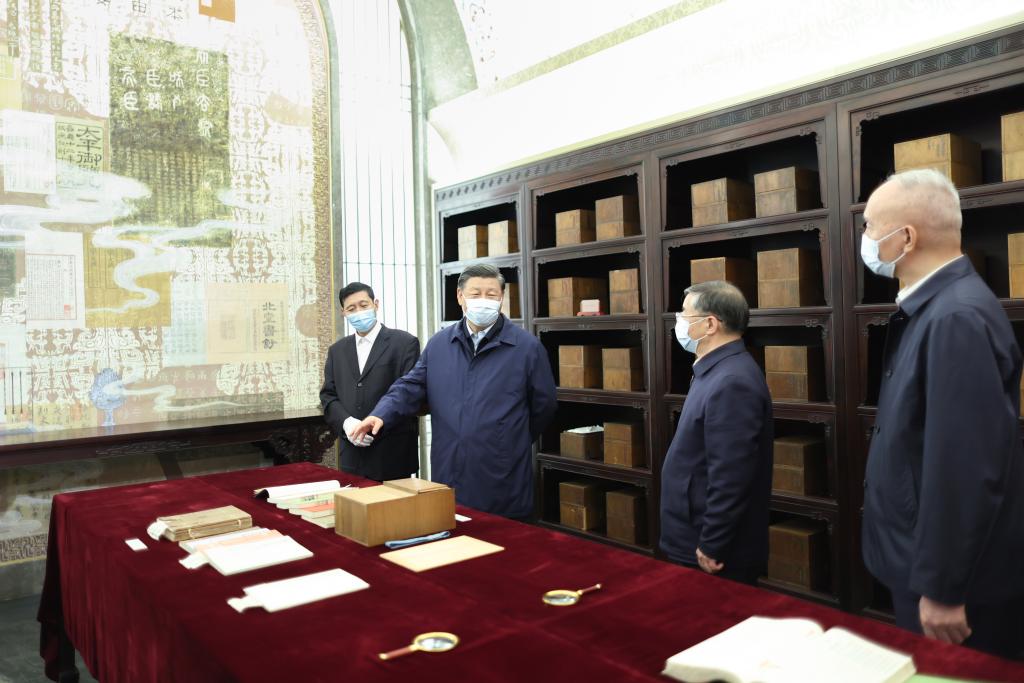Xi Focus-Profile: Xi Jinping, man of culture


In March 2018, Xi became the first Chinese president to take the oath of office in front of the Constitution. He mentioned the ancient saying, "When those who uphold the law are strong, the state is strong; when they are weak, the state is weak," emphasizing the need to advance reforms under the rule of law and enhance the rule of law in the process of reform.
"The issue of the rule of law versus the rule of man is a fundamental question in the history of politics and a significant problem that all countries must face and solve in the process of achieving modernization," he declared.
Xi has constructed and perfected the "spiritual lineage of the CPC," highlighting the tremendous mental strength the Party has demonstrated in key moments or chapters of its history. He is a staunch opponent of "historical nihilism." When some people online defamed revolutionary martyrs like Qiu Shaoyun, hundreds of thousands of Communist Youth League of China members posted rebuttals. Xi commended their response, "Righteousness has overwhelmed misconduct, well done!"
Xi introduced the concept of "profound changes unseen in a century," incorporating insights from a Marxist view of history and the ancient Chinese philosophy of "changes." In his report to the 20th CPC National Congress, he included "discarding the outdated in favor of the new" from the "Book of Changes," driving reforms in key areas.
Xi, a proven change-maker, draws upon his transformative experiences in Liangjiahe, where he defied skeptics and proceeded with the construction of the first methane-generating pit in the entire Shaanxi province.
Now, he advocates for embracing the enterprising and innovative spirit of the Chinese nation to propel China into an era of innovation.
In a discussion with academicians, he mentioned how, during the 18th century, under the direction of the Qing government, Western missionaries spent 10 years creating the unprecedentedly advanced "The Map of Imperial China." This map was kept secret within the imperial court while the missionaries took the data back to the West, organized and published it, resulting in the West having a better understanding of China's geography.
Xi uses this example to emphasize that scientific and technological development must be integrated with social progress. He stresses the need to deepen reforms in the management of science and technology, allowing all sources of innovation to flow freely.
Infusing both the principles of Marxist development theory and traditional Chinese dialectics, Xi has introduced a new philosophy advocating innovative, coordinated, green, and open development accessible to all. He urges an approach of "consolidating stability through progress and establishing the new before abolishing the old," employing Chinese philosophical perspectives to guide the nation's economic endeavors.
As an ardent fan of literature and art, he has vigorously promoted the flourishing of Chinese culture. In 2014, 72 years after the first such event, Xi chaired the second seminar on literature and art in CPC history, proposing concepts like "using literature to convey morality" and "cultivating people through culture." Attendees recalled that Xi spoke "like talking among friends and family," and he shook hands with everyone after the three-hour-long seminar.
He is enthusiastic about folk culture and arts, such as myths, epics, storytelling, and local operas. He encourages contemporary young novelists, poets, and painters to innovate, and extends support to the domestic science fiction film industry. This reflects his deep commitment to nurturing and promoting diverse aspects of Chinese cultural heritage and contemporary artistic expressions.
He emphasized the treasures passed down in Chinese culture -- the indivisibility of the territory, the order of the state, the unity of the nation, and the continuity of civilization -- asserting, "Our country must be reunified, and will surely be reunified."
Xi has adopted the traditional philosophy of "Tian Ren He Yi," or "unity of nature and man," to initiate an unprecedented campaign for ecological restoration and protection. This included a 10-year fishing ban on the Yangtze River to protect aquatic life. He likened the protection of the Yangtze River to traditional Chinese medicine treatment, stressing efforts to treat existing illnesses and prevent future ones. Under his leadership, China has witnessed historic changes in its environment, resulting in bluer skies, greener mountains, and clearer waters.
Xi tapped the ancient philosophy of favoring peace and harmonious coexistence in formulating foreign policy, proposing the concept of building a community with a shared future for humanity. He once told foreign leaders that China does not intend to only develop its backyard but rather a garden shared by all countries.
























